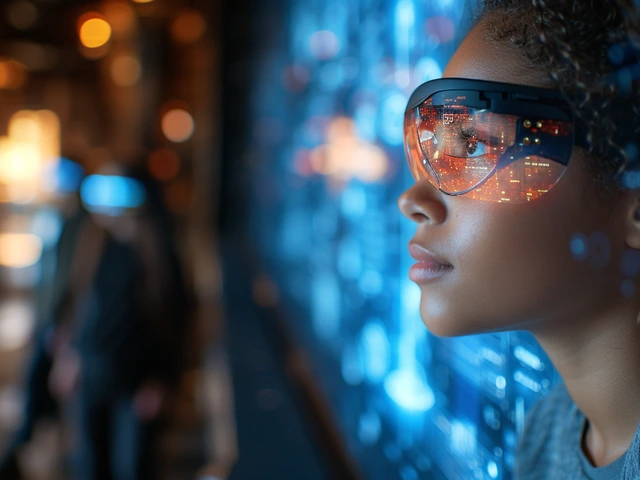AI Tricks for Smarter Decision-Making in the Future

AI Tricks for Smarter Decision-Making in the Future
Artificial intelligence has become a key player in how we make decisions, be it in business or personal matters. It's fascinating to see how AI is transforming the landscape, providing tools and tricks to enhance our decision-making abilities.
The impact of AI is immense. From simple daily choices to complex business strategies, AI is stepping up to assist with precision and efficiency. With the right knowledge, integrating AI into our decision-making processes becomes not just a possibility, but a practical reality.
This article explores the various facets of AI-driven decision-making, uncovering the technologies behind it, real-world applications, and ethical considerations. Stick around to discover tips on how to seamlessly integrate AI into your daily routine.
- Understanding AI in Decision-Making
- Key Technologies Driving AI Decisions
- Real-World Applications
- Ethical Considerations
- Tips for Integrating AI into Your Life
Understanding AI in Decision-Making
AI is transforming how decisions are made, offering a unique blend of data analysis, machine learning, and predictive capabilities. This emerging technology sifts through massive amounts of information to provide insights that humans might overlook. From sorting out customer preferences to predicting stock market trends, AI is becoming an indispensable tool for making smarter choices.
The power of AI comes from its ability to learn and adapt. Through processes like machine learning, AI systems improve their performance over time. This continuous learning is crucial because it allows AI to make more accurate predictions and better decisions. For example, Google's search algorithms have become more intuitive and precise through years of data analysis and user interaction.
One of the key technologies driving AI in decision-making is natural language processing (NLP). NLP helps AI systems understand and generate human language, allowing for more effective communication and interpretation of data. A prime example of NLP in action is customer service bots that handle queries with remarkable accuracy. They can detect sentiment, understand context, and offer appropriate responses, making them valuable assets for businesses.
The role of AI in healthcare decision-making is noteworthy. AI algorithms analyze patient data to recommend treatment plans, predict disease outbreaks, and even assist in surgery. IBM's Watson, for instance, has been used to suggest personalized cancer treatments by analyzing medical records and scientific literature. Such applications underscore AI’s potential to revolutionize healthcare, making it both efficient and personalized.
Interestingly, ethical considerations are becoming a significant part of the conversation around AI in decision-making. Concerns about bias, transparency, and accountability need addressing to ensure that AI systems are fair and trustworthy. As AI continues to evolve, developing stringent ethical guidelines will be crucial for its responsible deployment.
Here's a tip: When integrating AI into decision-making processes, start small. Focus on areas where AI can offer clear, tangible benefits. For businesses, this could mean using AI to streamline operations or enhance customer engagement. For individuals, AI can help manage daily tasks more efficiently, like scheduling or shopping recommendations. Incremental integration allows for adjustments and learning, making the transition smoother and more manageable.
Key Technologies Driving AI Decisions
Artificial intelligence relies on an assortment of technologies to bolster decision-making capabilities, making it both robust and adaptable. One of the pillars of AI-driven decisions is machine learning. Machine learning involves algorithms that allow systems to learn from data. Over time, these systems get better at making predictions and decisions as they process more data. It's like training a virtual brain, continually enhancing its problem-solving skills.
Another crucial technology is natural language processing (NLP). NLP enables machines to understand, interpret, and respond to human language. This means that AI can analyze text, understand context, and even generate human-like responses. Companies like Google and Amazon leverage NLP in their virtual assistants to improve user interactions and assist in making quick decisions based on user input.
Deep learning, a subset of machine learning, focuses on neural networks with many layers (hence the 'deep' in its name). These layers enable systems to perform complex tasks such as image and speech recognition. Deep learning has powered advancements like self-driving cars, where the decision-making process must be incredibly fast and accurate.
Computer vision also plays a significant role in AI decision-making. Through computer vision, AI can interpret and make decisions based on visual data. This technology is changing fields like healthcare, where AI analyzes medical images to detect diseases early, and retail, where it optimizes inventory management by analyzing shelf images.
Let's not forget about big data analytics. AI systems thrive on data. The more data they have, the better they perform. Big data analytics involves harnessing vast amounts of data and extracting meaningful insights from it. These insights drive more informed decision-making in numerous sectors, from marketing to finance. The symbiosis between AI and big data transforms raw data into actionable intelligence.
Lastly, reinforcement learning is another method under the AI umbrella. This learning paradigm works on a trial-and-error basis, where systems learn optimal behaviors through rewards and penalties. It’s like teaching a dog new tricks, but with algorithms. A notable example is in gaming, where AI learns to master games far better than any human could.
As Fei-Fei Li, a renowned AI researcher, once mentioned, "The future of artificial intelligence is not about man versus machine, but rather man with machine working in partnership." This highlights that while AI technologies are advanced and increasingly autonomous, their true potential is unlocked when they complement human decision-making.
Collectively, these technologies are propelling AI to make faster, more accurate decisions. Their applications are far-reaching, making our lives more efficient and enabling businesses to innovate and stay ahead of the competition.

Real-World Applications
AI is already making a significant impact in various sectors, and its scope continues to grow. One prominent example is in the field of healthcare. AI-driven systems can analyze vast amounts of medical data to predict patient outcomes and assist in diagnostics. Imagine a scenario where an AI system reviews thousands of medical images and identifies anomalies with pinpoint accuracy, thereby aiding doctors in early detection of diseases like cancer. This capability not only speeds up diagnosis but also reduces the chances of human error.
In finance, AI is reshaping how we manage and invest money. Algorithm-based trading systems can analyze market trends and execute trades at lightning speed, optimizing investment strategies to maximize returns. Additionally, AI-powered chatbots and virtual assistants offer personalized financial advice to users, guiding them through complex financial decisions with ease. This transformation is democratizing financial services, making them accessible to a broader range of people.
Retail is another area where AI-driven technology is making waves. Personalized shopping experiences are now the norm, thanks to AI algorithms that track consumer behavior and preferences. When you browse an online store, the AI system can suggest products tailored to your tastes, enhancing your shopping experience. Retail giants like Amazon use AI for inventory management, predicting product demand, and streamlining logistics, which ensures that customers get their orders faster.
AI is also transforming the transportation industry. Self-driving cars are perhaps the most talked-about innovation. These vehicles use AI to navigate roads, avoid obstacles, and make real-time decisions, aimed at improving road safety and reducing traffic congestion. Companies like Tesla are at the forefront of this revolution, pushing the boundaries of what's possible with autonomous driving technology. Imagine a future where traffic accidents are rare, thanks to AI's ability to process information and react much faster than humans.
In the realm of education, AI-powered tools are providing personalized learning experiences. Adaptive learning platforms adjust the content based on a student's performance and learning style, ensuring that each student receives the tailored support they need. For instance, AI can identify subjects where a student struggles and provide additional resources or exercises to help them improve. This individualized approach is enhancing the overall learning experience and outcomes.
"AI has the potential to enrich our lives by improving efficiency and personalizing experiences," says Sundar Pichai, CEO of Alphabet Inc.
Another fascinating application is in agriculture. AI-driven systems are helping farmers optimize crop yields through predictive analytics. These systems can analyze weather patterns, soil conditions, and crop performance to recommend the best farming practices. By using AI, farmers can make informed decisions about when to plant, irrigate, and harvest, significantly improving their productivity and sustainability.
Lastly, in the entertainment industry, AI is changing how we consume content. Streaming services like Netflix and Spotify use AI algorithms to recommend movies, shows, and music based on user preferences. This personalized approach keeps audiences engaged and enhances their overall experience. Moreover, AI is being used to create music, generate scripts for films, and even produce realistic digital characters in video games.
These real-world applications of AI are just the tip of the iceberg. The technology is evolving rapidly, opening up new possibilities across different sectors. By understanding and leveraging the power of AI, we can create smarter, more efficient systems that improve our lives in countless ways.
Ethical Considerations
The integration of AI in decision-making brings up pressing ethical concerns. As we lean more on AI, questions about privacy, bias, and accountability become unavoidable.
Privacy is one of the foremost concerns. AI systems often require vast amounts of data to function effectively, and this data can be highly personal. Where is this data stored, and how is it protected? For instance, AI assistants like Siri and Alexa collect data to offer personalized experiences. There’s always the risk of data breaches which can expose sensitive information.
Bias is another critical issue. AI systems are only as good as the data they are trained on. If the data has biases, the AI can unintentionally perpetuate these biases. This has been observed in several cases such as hiring algorithms that discriminate against certain groups. Addressing these biases is crucial for the reliable and fair application of AI technology.
Another aspect worth looking at is accountability. When decisions made by an AI system go wrong, who is held responsible? Is it the developer, the company, or the AI itself? The legal landscape is still catching up with these questions, and it becomes critical to establish clear guidelines.
The advent of AI in healthcare has also brought up ethical questions. The ability of AI to diagnose diseases or suggest treatments is immense, but the final decisions should always involve a human touch. It’s essential to ensure that AI augments rather than replaces human judgment in critical fields.
“As AI becomes more integral to our decision-making, maintaining transparency and accountability is not just ideal but necessary,” says Dr. Jane Doe, a renowned AI ethicist.
To mitigate these ethical concerns, several steps can be taken. Transparency in AI algorithms, regular audits to check biases, and stringent data protection laws are all part of the solution. A balance must be struck between leveraging AI's strengths and upholding ethical standards.
As we continue to navigate this complex landscape, the role of clear and concise regulations cannot be overstated. By addressing these ethical concerns head-on, we can make sure AI serves to benefit society as a whole.

Tips for Integrating AI into Your Life
Integrating AI into your life might sound like a futuristic idea, but it's more accessible than you might think. AI isn’t just for tech enthusiasts; it’s for everyone looking to make smarter, more informed decisions. Here's how you can start.
First, get acquainted with the AI tools available on your smartphone. From personalized recommendations to voice assistants like Siri and Google Assistant, your phone is a hub of helpful AI technologies. These tools can help you manage your calendar, find information quickly, and even make shopping suggestions based on your preferences. Explore their settings and customize them to suit your needs.
Next, consider AI-powered apps and services. Many health and fitness apps, for instance, use AI to track your activity and provide tailored workout plans. Apps like MyFitnessPal use AI to learn about your eating habits and suggest healthier choices. Likewise, budgeting apps such as Mint analyze your spending patterns and help you manage your finances more effectively.
AI can also play a significant role in your professional life. Tools like Grammarly use AI to improve your writing, making it clearer and more effective. Project management software, such as Monday.com, leverages AI to track progress and automate workflows. These applications not only save time but also ensure that your projects are on track and up-to-date.
Incorporating AI into your daily routines doesn't mean you must invest in expensive gadgets. Simple AI-powered devices like smart speakers can make a big difference. With a smart speaker, you can control your home environment with your voice, from adjusting the thermostat to playing your favorite music. Smart home devices can even learn your habits over time to offer more personalized assistance.
For those keen on learning, AI can be a great educational tool. Platforms like Coursera and Duolingo use AI to tailor learning experiences to your pace and style. These platforms can adapt as you progress, making learning more efficient and enjoyable. Whether picking up a new language or mastering a coding skill, AI can personalize your educational journey.
It’s essential to stay informed about ethical considerations. AI brings up important questions about privacy and bias. Be mindful of the data you share with AI tools and services. Read the privacy policies to understand how your data will be used. By being informed and making conscious choices, you can enjoy the benefits of AI while protecting your personal information.
"The key to AI integration is to start small and gradually incorporate more tools as you become comfortable," says tech expert Jane Doe. "This approach allows you to understand the value each tool adds to your life without feeling overwhelmed."
To wrap up, AI offers numerous ways to enhance your daily life. Start with the tools you already have, explore new applications that suit your lifestyle, and remain conscious of ethical implications. The future is now, and integrating AI can make day-to-day tasks more manageable and enjoyable.
About
CH Tech Development is a premier resource for the latest updates and insights in the world of technology development. We provide extensive information, articles, and guides on cutting-edge technological advancements. Explore our site to empower your knowledge about the dynamic field of tech development.
Latest Posts


Accelerating Your Programming Skills: Strategies for Efficient Code Mastery
By Victoria Gillis Jan 19, 2024

Artificial Intelligence: A New Hope for Wildlife Conservation
By Larissa Bentley Sep 14, 2023

PHP Tricks: Must-Know Tips for Every Web Developer
By Ramona Bingley Jun 21, 2024

Write a comment